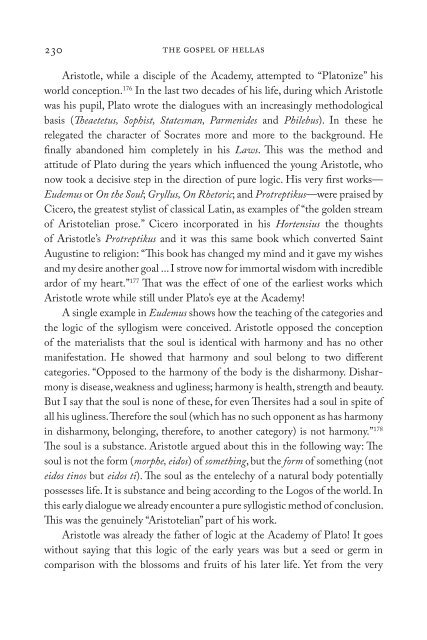The Gospel of Hellas - Research Institute for Waldorf Education
The Gospel of Hellas - Research Institute for Waldorf Education
The Gospel of Hellas - Research Institute for Waldorf Education
Create successful ePaper yourself
Turn your PDF publications into a flip-book with our unique Google optimized e-Paper software.
0 the gospel <strong>of</strong> hellas<br />
Aristotle, while a disciple <strong>of</strong> the Academy, attempted to “Platonize” his<br />
world conception. 176 In the last two decades <strong>of</strong> his life, during which Aristotle<br />
was his pupil, Plato wrote the dialogues with an increasingly methodological<br />
basis (<strong>The</strong>aetetus, Sophist, Statesman, Parmenides and Philebus). In these he<br />
relegated the character <strong>of</strong> Socrates more and more to the background. He<br />
finally abandoned him completely in his Laws. This was the method and<br />
attitude <strong>of</strong> Plato during the years which influenced the young Aristotle, who<br />
now took a decisive step in the direction <strong>of</strong> pure logic. His very first works—<br />
Eudemus or On the Soul; Gryllus, On Rhetoric; and Protreptikus—were praised by<br />
Cicero, the greatest stylist <strong>of</strong> classical Latin, as examples <strong>of</strong> “the golden stream<br />
<strong>of</strong> Aristotelian prose.” Cicero incorporated in his Hortensius the thoughts<br />
<strong>of</strong> Aristotle’s Protreptikus and it was this same book which converted Saint<br />
Augustine to religion: “This book has changed my mind and it gave my wishes<br />
and my desire another goal ... I strove now <strong>for</strong> immortal wisdom with incredible<br />
ardor <strong>of</strong> my heart.” 177 That was the effect <strong>of</strong> one <strong>of</strong> the earliest works which<br />
Aristotle wrote while still under Plato’s eye at the Academy!<br />
A single example in Eudemus shows how the teaching <strong>of</strong> the categories and<br />
the logic <strong>of</strong> the syllogism were conceived. Aristotle opposed the conception<br />
<strong>of</strong> the materialists that the soul is identical with harmony and has no other<br />
manifestation. He showed that harmony and soul belong to two different<br />
categories. “Opposed to the harmony <strong>of</strong> the body is the disharmony. Disharmony<br />
is disease, weakness and ugliness; harmony is health, strength and beauty.<br />
But I say that the soul is none <strong>of</strong> these, <strong>for</strong> even <strong>The</strong>rsites had a soul in spite <strong>of</strong><br />
all his ugliness. <strong>The</strong>re<strong>for</strong>e the soul (which has no such opponent as has harmony<br />
in disharmony, belonging, there<strong>for</strong>e, to another category) is not harmony.” 178<br />
<strong>The</strong> soul is a substance. Aristotle argued about this in the following way: <strong>The</strong><br />
soul is not the <strong>for</strong>m (morphe, eidos) <strong>of</strong> something, but the <strong>for</strong>m <strong>of</strong> something (not<br />
eidos tinos but eidos ti). <strong>The</strong> soul as the entelechy <strong>of</strong> a natural body potentially<br />
possesses life. It is substance and being according to the Logos <strong>of</strong> the world. In<br />
this early dialogue we already encounter a pure syllogistic method <strong>of</strong> conclusion.<br />
This was the genuinely “Aristotelian” part <strong>of</strong> his work.<br />
Aristotle was already the father <strong>of</strong> logic at the Academy <strong>of</strong> Plato! It goes<br />
without saying that this logic <strong>of</strong> the early years was but a seed or germ in<br />
comparison with the blossoms and fruits <strong>of</strong> his later life. Yet from the very

















